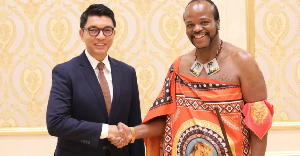....promoting sexual promiscuity - Medical Officer
Dr Charles Vardon Odonkor, a private medical practitioner and an AIDS activist, has called for the abolition of cultural practices that promoted sexual promiscuity.
Addressing the Tema Local Council of Churches at Tema Zone One as part of its Bible teaching service, he noted that such practices contributed to the spread of sexually transmitted diseases including the dreadful Acquired Immune Deficiency Syndrome (AIDS).
Dr Odonkor criticised some traditional practices such as the "Kplabi" among some tribes in the Greater Accra Region whereby a young girl must prove her womanhood by producing a baby out of wedlock as well as some widowhood practices that were incorporated into funeral rites that encouraged a widow to be given out in marriage to a relative of a deceased.
The practice of giving a young girl away in marriage to a man with several wives must also cease since both the girl's and the man's HIV status might not be known.
Dr Odonkor, therefore, appealed to churches, mosques and traditional elders to use their expertise to ensure that all traditional practices that involved unprotected sex were discarded.
He said there was the likelihood that these leaders were aware of the dangers involved in these practices "but they all seem to look away whilst their flock infect themselves with HIV."
The AIDS activist noted that the alarming rate at which the disease was claiming lives, particularly those in the productive group called for everyone's concern to work hard to reverse the trend of 200 people getting infected daily in Ghana.
He said HIV prevalence in Ghana was currently 3.6 per cent but observed that some areas including Agomenya and Ada in the Greater Accra had rates as high as 6.3 per cent "due to some cultural and social practices".
He reiterated that, even though HIV could be contracted in various ways including through the placenta and breast milk to the newborn baby, blood transfusion, sharing of needles/syringes and un-sterilised razor, the major mode of transmission was through sex.
To avoid contracting it, Dr Odonkor advised against sexual promiscuity and maintaining one sexual partner while those who could not control their sexual excitement should use the condom.
He described the disease as being very dangerous because one could be infected but might not show any sign of ill health up to 10 years.












